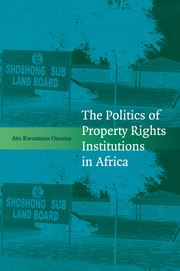Book contents
- Frontmatter
- Contents
- List of Maps and Tables
- Acknowledgments
- List of Abbreviations and Acronyms
- 1 Map of Botswana
- 2 Map of Ghana
- 3 Map of Kenya
- 1 Divergent Attitudes Towards Property Rights Institutions
- 2 Explaining Institutional Choice and Change
- 3 Varying Responses by Ghanaian and Batswana State Leaders
- 4 Traditional Leaders Take Charge in Akyem Abuakwa and Ga
- 5 Building and Then Demolishing Institutions in Kenya
- 6 Endogenous Contributions to Institutional Change
- 7 Conclusion
- Appendix: Notes on Field Research
- Index
- References
4 - Traditional Leaders Take Charge in Akyem Abuakwa and Ga
Published online by Cambridge University Press: 04 May 2010
- Frontmatter
- Contents
- List of Maps and Tables
- Acknowledgments
- List of Abbreviations and Acronyms
- 1 Map of Botswana
- 2 Map of Ghana
- 3 Map of Kenya
- 1 Divergent Attitudes Towards Property Rights Institutions
- 2 Explaining Institutional Choice and Change
- 3 Varying Responses by Ghanaian and Batswana State Leaders
- 4 Traditional Leaders Take Charge in Akyem Abuakwa and Ga
- 5 Building and Then Demolishing Institutions in Kenya
- 6 Endogenous Contributions to Institutional Change
- 7 Conclusion
- Appendix: Notes on Field Research
- Index
- References
Summary
When Kofi Bediako, a Ghanaian engineer who had worked and resided in the United States for many years, decided to return home to retire, he bought a plot of land from a traditional chief for the handsome sum of $2400 to construct a house in a peri-urban area of the Ghanaian capital Accra. However, like many who try to buy land in this area, Mr. Bediako's experiences were soon to become a nightmare.
As he was building his house, another Ghanaian who had recently returned from a sojourn in Britain claimed the same land and issued Mr. Bediako with court papers, requesting that he stop development of the plot. But while they were in court contesting ownership of the land, a third party, also claiming the land, brought in landguards armed with a bulldozer to tear down Kofi's development and keep all intruders off the land. Further investigation revealed that all three claimants had been sold the same piece of land by a chief who remained free even as the buyers fought over possession of the land.
The venality of some government officials and the generally low capacity of the Land Title Registry and the Lands Commission made searches of the register for ownership information not a particularly useful way of finding who owned parcels of land. Landguards thus took a leading role in protecting and contesting land rights in the Ga Traditional Area in which the capital city Accra is located.
- Type
- Chapter
- Information
- The Politics of Property Rights Institutions in Africa , pp. 105 - 143Publisher: Cambridge University PressPrint publication year: 2009



